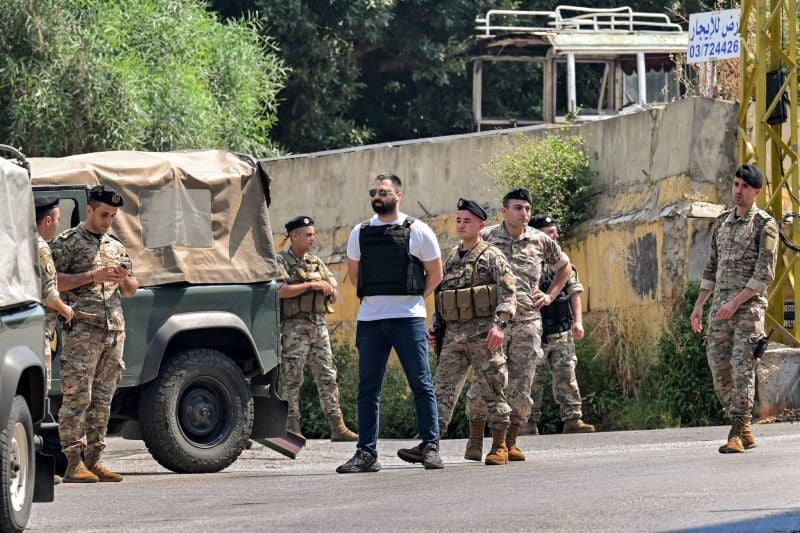
The Lebanese army deployed near the American embassy in Beirut on June 5, 2024, after the arrest of a Syrian following a shootout near the chancellery. (Credit: Joseph Eid/AFP)
The shooting in the vicinity of the U.S. Embassy in Aoukar, Metn, on Wednesday morning, prompted numerous reactions in the political sphere, starting with the prime minister, several ministers, as well as political leaders and MPs from various parties, who saw it as an attack on relations between Beirut and Washington.
The caretaker prime minister, Najib Mikati, said in a statement that he was “monitoring” the situation and had made a series of contacts to this end, notably with the heads of the various security services. “The situation is stable, and in-depth investigations have been launched,” he added. He added that, according to the information at his disposal, the American ambassador in Beirut, Lisa Johnson, was out of the country.
The shooting took place in front of the American Embassy, and several people were arrested in its wake, according to two security sources contacted by L'Orient-Le Jour and the state-run National News Agency (NNA). The exchange of fire between a suspect of Syrian origin and the army left two people wounded, according to the troops: The gunman, who was hospitalized, and a person who was inside the embassy complex.
Lebanon's caretaker foreign minister, Abdallah Bou Habib, said he was following developments, assuring that Lebanon was “committed to protecting the headquarters of diplomatic representations in Beirut in accordance with the Vienna Convention on Diplomatic Relations.” This treaty governs diplomatic relations between states, the immunity of diplomatic personnel and the inviolability of embassies. It was adopted on April 18, 1961 in Vienna and came into force on April 24, 1964.
The caretaker Lebanese defense minister, Maurice Slim, contacted the embassy to express his solidarity. In a statement, he assured us that the forces of law and order were continuing their investigation to find answers.
Political figures also spoke out, mostly on X (formerly Twitter), to denounce the incident and, above all, its implications. One of the most outspoken was that of Samy Gemayel, head of the opposition Kataeb Party, who described the incident as further proof “of the insecurity that reigns due to the law of the jungle established by Hezbollah and its allies.” “All those who oppose Hezbollah's policies are threatened, and this incident is a message,” he continued.
A “message” is also the term used by the opposition National Liberal Party (NLP) to describe the incident, believing it to be a sign of “a plan fomented against Lebanon with a view to a security explosion.” The NLP said it refused “to allow Lebanon to become a mailbox for sending messages to the United States or others.” This refusal to see Lebanon transformed into a “mailbox” was also shared by the Free Patriotic Movement (FPM), which expressed its “concern” in a press release.
The “seriousness of the situation” was highlighted in statements by several MPs on X, such as Farid al-Khazen, Melhem Khalaf and Raji al-Saad, who all strongly denounced the attack. MP Wajih Baarini called it “an act of vandalism,” saying it “targets Lebanon and its stability.” The aggression is “directed against Lebanon and its privileged relationship with the United States” wrote MP Fouad Makhzoumi, also on X.
The LF and civil peace
The Lebanese Forces (LF) strongly condemned the attack on the U.S. embassy. The party called on “the Lebanese security services and judiciary to carry out the necessary investigations to uncover the circumstances of what happened, and the identity of the planners and perpetrators,” in order to “prevent the repetition of such criminal acts, threatening public security and civil peace.”
Also, Walid Joumblatt's Progressive Socialist Party (PSP) condemned the attack, calling on the security services to catch the culprits as quickly as possible, “to ensure that such incidents are not repeated and endanger civil peace, in a difficult context in Lebanon.”
This article originally appeared in French in L'Orient-Le Jour.